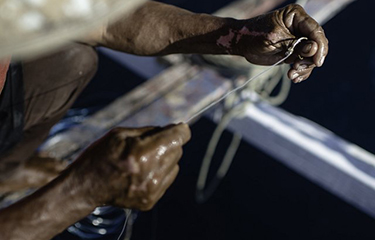The International Pole and Line Foundation (IPNLF), in partnership with IPNLF member Asosiasi Perikanan Pole and Line dan Handline Indonesia (AP2HI), has announced that eight Indonesian one-by-one tuna fisheries have achieved Marine Stewardship Council (MSC) certification.
One of the largest seafood producers in the world, Indonesia and its fisheries play a crucial part in safeguarding marine ecosystems and global seafood suppliers, according to IPNLF. The fisheries that have earned MSC certification all utilize selective, small-scale operations for harvesting tuna. They signify how small-scale fisheries can compete and contribute to the global marketplace, AP2HI and IPNLF said.
“The advancement of these fisheries towards certification, is a tangible demonstration of the ability of small-scale fisheries to support their local communities and compete in the global marketplace,” IPNLF said.
Indonesian Ministry of Maritime Affairs and Fisheries Director of Fish Resources Management Trian Yunanda said improving data collection and monitoring has been integral in moving the fisheries forward.
“IPNLF and AP2HI have been working closely with MMAF on improving data collection and fisheries monitoring programs, leading to more effective management of these fisheries. All of us need to recognize the important role that truly sustainable fisheries, that contribute to environmental, social, and economic improvements, can make to the livelihoods of our fishers, and to the viability of our businesses. These actions lead to healthier oceans for us and for future generations,” Yunanda said.
The certification of the eight fisheries, located throughout the Indonesian archipelago, will add nearly 11,000 metric tons of one-by-one skipjack and yellowfin tuna that is socially and environmentally responsible to seafood markets.
“Nine different AP2HI members are involved in these small-scale fishery supply chains, which incorporates 307 handline and 73 larger pole-and-line vessels. The catches are part of the regional Western and Central Pacific Ocean stocks,” AP2HI said.
The efforts put forth by AP2HI members, other stakeholders, and the ministry were celebrated by IPNLF Southeast Asia Director Jeremy Crawford.
“We are pleased to be part of this important process of building value in the local one-by-one tuna supply chains. Together with our local partners, and with the support of the Indonesian Ministry of Marine Affairs and Fisheries (MMAF), IPNLF has been able to realize significant improvements in fishery operations, governance, and in securing livelihoods,” Crawford said.
Improvement programs developed include “fishery data collection and monitoring, which are carried out by local onboard observers and portside enumerators who collect valuable information, at sea and on land, to better understand the environmental impacts associated with fishing operations,” IPNLF said.
At sea, electronic monitoring systems for small-scale fisheries have been implemented through time-lapse cameras, vessel tracking, and working with the government on analyzing vessel monitoring system (VMS) data. On land, IPNLF and AP2HI have been working closely with fishery operators to improve chain of custody and fishery compliance to national regulations, and engage governments.
“Getting these eight fisheries to this crucial point has required a huge collective effort and I am very proud of the manner in which all parties involved continue to pull together – to build healthier fisheries and healthier oceans – now and for future generations," AP2HI Chair Janti Djuari said. "Our hope is that these fisheries will soon be able to supply consumers with sustainable one-by-one caught tuna. This initiative will not only help improve the livelihoods of our traditional one-by-one fishermen, but will also ensure a sustainable industry."
Worldwide demand for sustainably-caught tuna caught using economically and socially responsible processes has been increasing, IPNLF said.
“While industrial (purse-seine) boats operating in the Indonesian economic zone are responsible for the largest catches, their environmental impact is much greater than those of one-by-one fisheries. International markets, where consumers demand ethical sourcing of their seafood choices, have supported the implementation of improvement projects, expressing their commitment to source from these fisheries in a special joint agreement in June 2018, signed between MMAF, IPNLF and 14 buyers, brands, and retailers,” the organization said.
The aforementioned buyers, Crawford said, have pledged to preferentially source MSC-certified one-by-one tuna from Indonesia’s tuna fisheries over non-certified tuna once the products are available.
“Promises such as these provide further validation of the critical role played by fisheries that put the three pillars of sustainability – environmental, social, and economic benefits – at the forefront of their operations," Crawford said. "It is the only way to ensure that these vulnerable communities retain access to food security and economic wellbeing in the long-term."
Photo courtesy of the International Pole and Line Foundation







